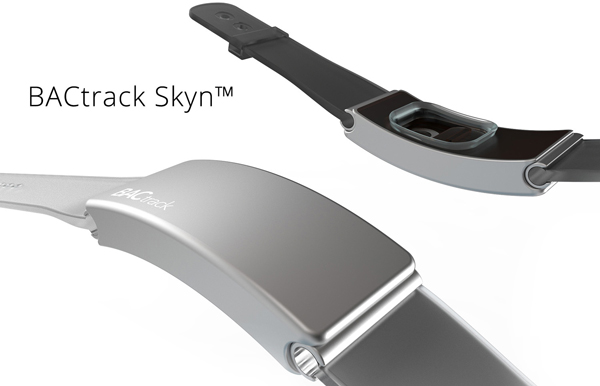A company that makes portable blood alcohol testers has won a national prize for a wearable version that looks like a fitness tracker and delivers results in near-real time.
 The San Francisco company, BACtrack, will receive $200,000 from the National Institute on Alcohol Abuse and Alcoholism (NIAAA) for its prototype entry, the BACtrack Skyn. The device is worn on the wrist and offers continuous and non-invasive monitoring of a user’s blood-alcohol content (BAC). It uses a fuel-cell technology like that in devices used by police for roadside BAC testing and connects via Bluetooth to a smartphone to store data.
The San Francisco company, BACtrack, will receive $200,000 from the National Institute on Alcohol Abuse and Alcoholism (NIAAA) for its prototype entry, the BACtrack Skyn. The device is worn on the wrist and offers continuous and non-invasive monitoring of a user’s blood-alcohol content (BAC). It uses a fuel-cell technology like that in devices used by police for roadside BAC testing and connects via Bluetooth to a smartphone to store data.
“We are thrilled to win the Wearable Alcohol Biosensor Challenge,” said BACtrack CEO Keith Nothacker on the company’s website. “We’re excited to bring BACtrack Skyn to market to aid researchers and treatment providers in collecting more reliable data and ultimately, make advances in healthcare treatment.”
The company said it configured BACtrack Skyn to buzz the phone when a user approaches 0.04% BAC, or ping a family member if a supposedly sober user is breaking the rules. It will be available for sale for about $99 in the fourth quarter of 2016.
Second prize in the contest went to Milo, a Santa Barbara technology startup, for a wrist-worn device that uses disposable cartridges to continuously track BAC and also pairs with a smartphone.
Most of the contest’s eight entries took the form of fitness tracker-type watches that estimate BAC based on the amount of alcohol escaping through perspiration known as “transdermal monitoring.” One notable exception was a color-changing temporary tattoo applied directly to the skin.
“NIAAA issued this challenge to spark innovation in alcohol biosensor development. We were very pleased at the level of response and quality of prototypes that we received from the biotech community,” said NIAAA director George Koob, PhD, in an agency statement.
The challenge, issued in March 2015, called for non-invasive, wearable technology that could improve upon existing alcohol biosensor technology used in the criminal justice system. An improved alcohol biosensor could be a valuable resource for the alcohol research community, decreasing reliance on participant self-report in scientific studies, the institute said.
Read More – Source: This New Wearable Measures Your Blood Alcohol | Qmed